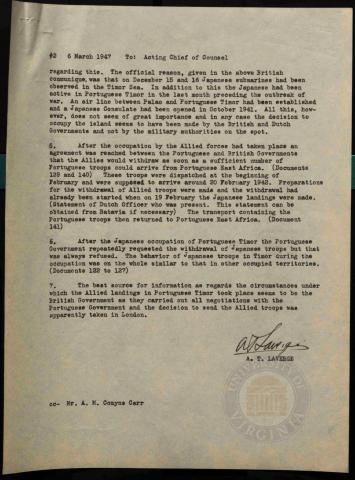
Page 2
| Parent | Japanese Occupation of Portuguese Timor |
|---|---|
| Date | 6 March 1947 |
| Language | English |
| Collection | Tavenner Papers & IMTFE Official Records |
| Box | Box 4 |
| Folder | General Reports and Memoranda from March 1947 |
| Repository | University of Virginia Law Library |
#2 6 March 1947 To: Acting Chief of Counsel
regarding this. The official reason, given in the above British communique, was that on December 15 and 16 Japanese submarines had been observed in the Timor Sea. In addition to this the Japanese had been active in Portuguese Timor in the last month preceding the outbreak of war. An air line between Palao and Portuguese Timor had been established and a Japanese Consulate had been opened in October 1941. All this, how¬ever, does not seem of great importance and in any case the decision to occupy the island seems to have been made by the British and Dutch Governments and not by the military authorities on the spot.
5.After the occupation by the Allied forces had taken place an agreement was reached between the Portuguese and British Governments that the Allies would withdraw as soon as a sufficient number of Portuguese troops could arrive from Portuguese East Africa. (Documents 139 and 140) These troops were dispatched at the beginning of February and were supposed to arrive around 20 February 1942. Preparations for the withdrawal of Allied troops were made and the withdrawal had already been started when on 19 February the Japanese landings were made. (Statement of Dutch Officer who was present. This statement can be obtained from Batavia if necessary) The transport containing the Portuguese troops then returned to Portuguese East Africa. (Document 141)
6.After the Japanese occupation of Portuguese Timor the Portuguese Government repeatedly requested the withdrawal of Japanese troops but that was always refused. The behavior of Japanese troops in Timor during the occupation was on the whole similar to that in other occupied territories. (Documents 122 to 127)
7.The best source for information as regards the circumstances under which the Allied landings in Portuguese Timor took place seems to be the British Government as they carried out all negotiations with the Portuguese Government and the decision to send the Allied troops was apparently taken in London.
A. T. Laverge
cc- Mr. A. M. Comyns Carr
